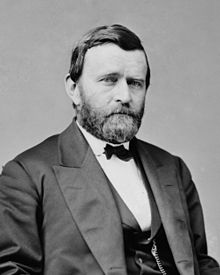📖 Presidential Profile
Comprehensive overview of leadership, policies, and historical significance
📋 Biography & Political Journey
Military Career and Civil War Leadership
Hiram Ulysses Grant was born on April 27, 1822, in Point Pleasant, Ohio, to Jesse Root Grant and Hannah Simpson Grant. A clerical error at West Point changed his name to Ulysses S. Grant, which he kept throughout his life. After graduating from West Point in 1843, he served in the Mexican-American War under Generals Zachary Taylor and Winfield Scott. Following the war, Grant struggled with alcohol and failed business ventures, working as a farmer and store clerk before the Civil War began.
When the Civil War erupted, Grant quickly rose through Union ranks due to his aggressive tactics and strategic brilliance. His victories at Fort Donelson and Vicksburg established him as the North’s most successful general, earning him the nickname “Unconditional Surrender Grant.” President Lincoln promoted him to General-in-Chief in 1864, and Grant’s relentless campaigns against Robert E. Lee ultimately forced the Confederacy’s surrender at Appomattox Court House on April 9, 1865. His magnanimous treatment of Lee and Confederate soldiers helped begin the healing process after the war.
Grant’s immense popularity as the Union’s savior made him the obvious Republican presidential candidate in 1868. Running on the slogan “Let us have peace,” he easily defeated Democrat Horatio Seymour with 214 electoral votes to 80. His presidency focused heavily on Reconstruction policies, including the ratification of the 15th Amendment guaranteeing voting rights regardless of race. Grant used federal troops to enforce civil rights laws and combat the Ku Klux Klan, demonstrating his commitment to protecting newly freed slaves.
Scandal-Plagued Administration
Despite his personal honesty, Grant’s presidency was marred by numerous scandals involving his appointees and associates. The Black Friday Gold Panic of 1869 occurred when financiers Jay Gould and James Fisk attempted to corner the gold market with inside information, believing Grant would not release government gold. The Crédit Mobilier scandal involved the Union Pacific Railroad’s construction company bribing congressmen with stock shares. The Whiskey Ring saw federal revenue agents and distillers conspiring to evade taxes, with Grant’s private secretary Orville Babcock implicated. These scandals, along with the Salary Grab Act and Black Friday Gold Rush, severely damaged public trust in government and overshadowed Grant’s legitimate achievements in civil rights and Reconstruction.
The Great White House Croquet Controversy
One of the more amusing episodes of Grant’s presidency involved his passion for croquet, which became a national sensation during his administration. Grant installed a croquet court on the White House grounds and became obsessively competitive about the game, often playing for hours with family, guests, and staff. The president was known to become visibly upset when losing and would sometimes demand rematches late into the evening. “The President takes his croquet very seriously,” noted one White House visitor, describing how Grant would study the angles of shots with the same intensity he once applied to military campaigns. The sight of the famous Civil War general hunched over a croquet mallet, intensely focused on knocking wooden balls through hoops, provided endless amusement to the press and public.
Humor & Jokes
Grant's Drinking
Ulysses Grant allegedly drank too much, but he won the Civil War anyway. Functional alcoholism:…
Read More →Greatest Wins
🏞️ Creation of Yellowstone National Park
Grant signed legislation establishing America's first national park, pioneering the global conservation movement and preserving…
Read More →Epic Fails
🥃 The Whiskey Ring Tax Evasion Scandal
Grant's private secretary led a conspiracy to defraud the government of liquor taxes, exposing corruption…
Read More →